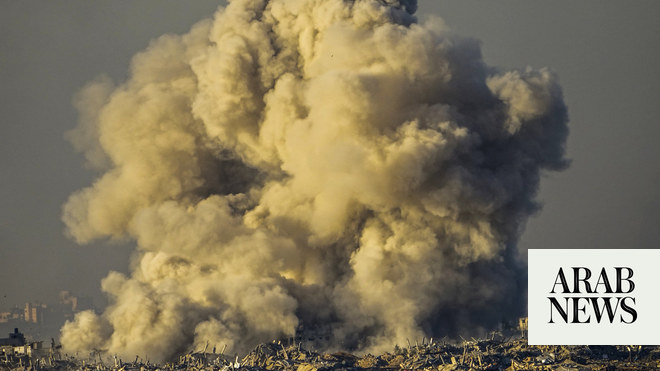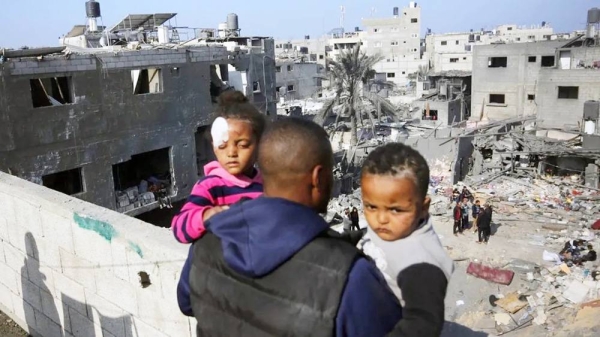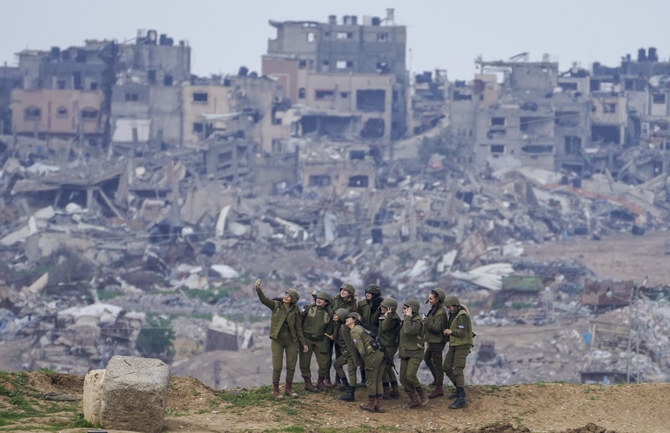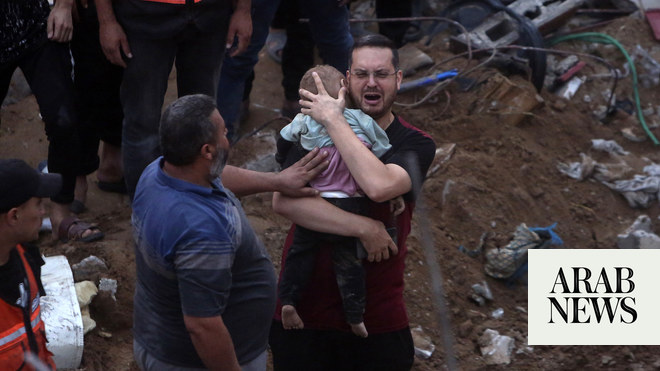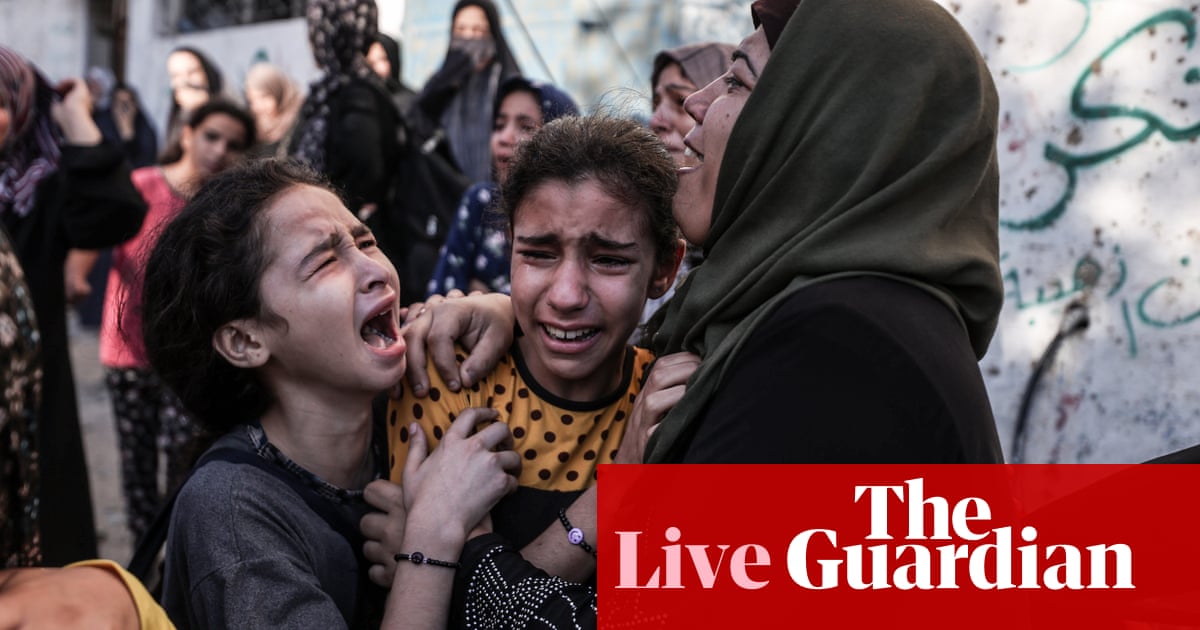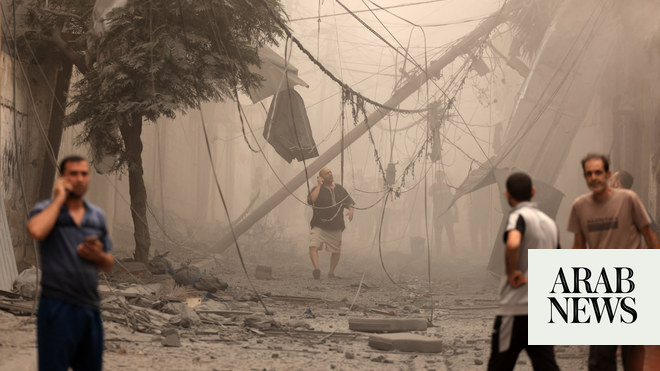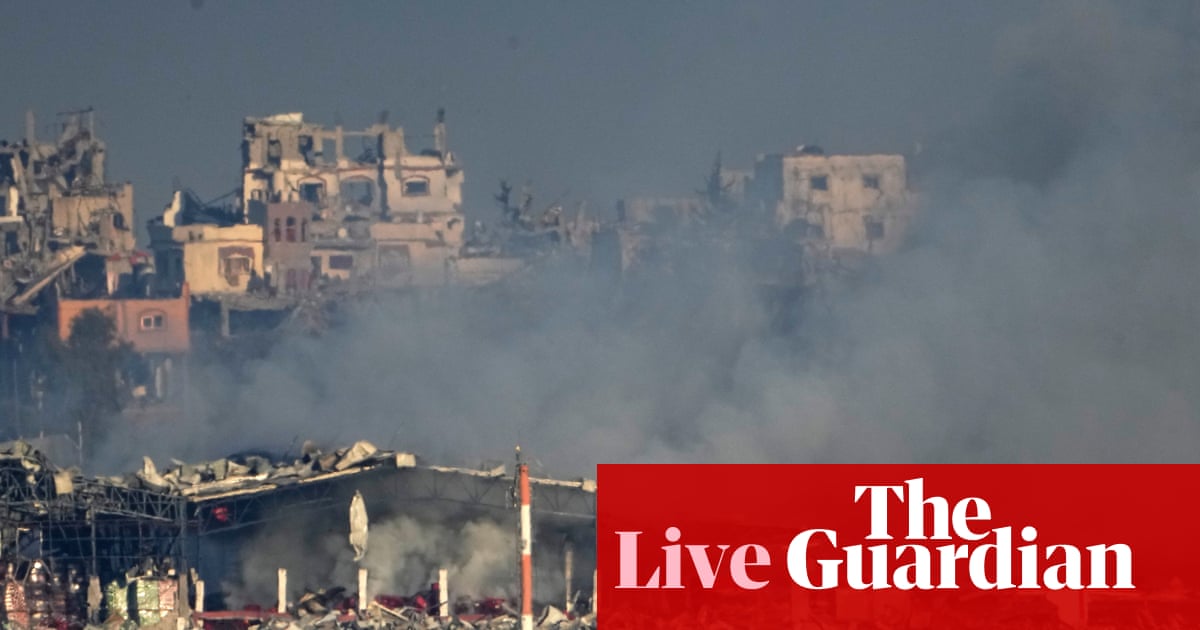
Gaza health ministry: Israeli strikes kill 90 Palestinians in Jabalia refugee camp
Israeli strikes killed 90 Palestinians in Jabalia refugee camp in northern Gaza on Sunday, a Gaza health ministry spokesperson told Reuters.
Videos posted online of what appeared to be the aftermath of the latest Israeli strike showed Palestinians digging through the rubble for survivors with shovels and their bare hands.
Since 7 October, Israel has attacked Jabalia refugee camp multiple times.
Following one of Israel’s airstrikes on Jabalia refugee camp last month, the UN human rights office said that it had “serious concerns that these are disproportionate attacks that could amount to war crimes”.
France said that one of its workers was killed by an Israeli attack in Rafah, Reuters reports.
According to French foreign minister Catherine Colonna, who spoke to journalists following a visit to Israel and the West Bank, the man who was killed was a Palestinian national who worked for the French Institute for decades.
The French foreign ministry said earlier that the man was seeking refuge in the house of a colleague from the French consulate along with two other co-workers and several family members, Reuters reports.
“The house was hit by an Israeli air strike on Wednesday evening, which seriously hurt our agent and killed about 10 others,” the ministry said.
According to the ministry, the man later died from his wounds by the Israeli strike. It did not provide a date.
“We’ve asked for explanations as to why the house ... had been hit,” Colonna told reporters.
Brother of Israeli hostage accidentally killed by IDF says army "murdered" him
The brother of Alon Shamriz, a 26-year-old Israeli hostage who was accidentally killed by the Israel Defense Forces and buried on Sunday, said that the Israeli army “abandoned” and “murdered” him.
Agence France-Presse reports:
Alon Shamriz, 26, was one of the three Israeli hostages shot dead by soldiers during an operation in the Gaza City suburb of Shejaiya, even as they carried a white flag and cried for help in Hebrew.
Shamriz, Yotam Haim and Samer Al-Talalqa were killed when troops mistook them for a threat and opened fire, the army said.
‘Those who abandoned you also murdered you after all that you did right,’ Ido, brother of Shamriz said at the funeral in kibbutz Shefayim north of Tel Aviv attended by dozens of relatives and family members.
‘You survived 70 days in hell,’ Shamriz’s mother, Dikla, said in her eulogy. ‘Another moment and you would have been in my arms.’
Israeli media reported that Al-Talalqa was buried on Saturday, while the funeral for Haim was scheduled on Monday.
The deaths of the three men, all in their twenties, have sparked protests in Tel Aviv as demonstrators demanded that the authorities offer a new plan for bringing home the remaining hostages held in the Gaza Strip.
Here are some images of pro-Palestine rallies held across the world this weekend as demonstrators demanded for a ceasefire in Gaza, where close to 19,000 Palestinians have been killed by Israeli airstrikes in the last two months:
Fears are growing of an all-out Israel-Hezbollah war as fighting escalates.
The Guardian’s Julian Borger reports:
When the news first broke of the Hamas attack early on 7 October, Itai Reuveni and the other reservists in his paratrooper battalion packed their bags and arrived at their muster point well before their call-up came from the army.
The paratroopers did not head south to Gaza but to the northern border, where they believed a far greater threat than Hamas was poised to join the fight: Hezbollah, the Lebanese Shia movement backed by Tehran.
‘We’re here to make sure that no one does to us in the north what they did to us in the south,’ said Reuveni, 40, a master sergeant who in his civilian life does thinktank research on terrorist financing.
‘We understand that Hezbollah is much more sophisticated [than Hamas]. We understand it’s not 3,000 fighters that come over the border, it will be much more, and you’ll also have Iran in the equation. We are here to deal with that.’
Reuveni is not alone in seeing Hezbollah as the greater danger to Israel. The Israeli defence minister, Yoav Gallant, and other hawks in the cabinet argued for a pre-emptive strike against the militant group in the immediate aftermath of the 7 October attack. That caused alarm in Washington, fearful of a regional war that could pull Iran into the fight. With US backing, Benjamin Netanyahu fended off the proposal, but the conviction has taken hold among Israeli politicians, generals and a widening slice of the public that a new war in Lebanon is inevitable.
World Health Organization "appalled" by Israel"s attack on Gaza"s Kamal Adwan hospital
The World Health Organization (WHO) said that it is “appalled” following Israel’s deadly raid on Gaza’s Kamal Adwan hospital over the weekend.
After Israel’s destruction of the only working hospital in northern Gaza through which witness reports emerged accusing Israeli forces of crushing Palestinians, including wounded patients, using bulldozers, WHO chief Tedros Ghebreyesus said:
WHO is appalled by the effective destruction of Kamal Adwan hospital in northern #Gaza over the last several days, rendering it non-functional and resulting in the death of at least 8 patients.
Many health workers were reportedly detained, and WHO and partners are urgently seeking information on their status.”
We learned that many patients had to self-evacuate at great risk to their health and safety, with ambulances unable to reach the facility. Of the deceased patients, several died due to lack of adequate health care, including a 9-year-old child.
We are extremely concerned for the well-being of the internally displaced people who are reportedly sheltering in the hospital building.
Gaza’s health system was already on its knees, and the loss of another even minimally functioning hospital is a severe blow.
Attacks on hospitals, health personnel and patients must end. Ceasefire NOW.
Gaza health ministry: Israeli strikes kill 90 Palestinians in Jabalia refugee camp
Israeli strikes killed 90 Palestinians in Jabalia refugee camp in northern Gaza on Sunday, a Gaza health ministry spokesperson told Reuters.
Videos posted online of what appeared to be the aftermath of the latest Israeli strike showed Palestinians digging through the rubble for survivors with shovels and their bare hands.
Since 7 October, Israel has attacked Jabalia refugee camp multiple times.
Following one of Israel’s airstrikes on Jabalia refugee camp last month, the UN human rights office said that it had “serious concerns that these are disproportionate attacks that could amount to war crimes”.
Israel and Hamas are both open to a renewed deal involving a ceasefire and hostage release, although disagreements on detail remain, two Egyptian security sources told Reuters on Sunday.
According to the sources, Hamas is insisting on setting the list of hostages to be released unilaterally and demanding Israel withdraw its forces behind pre-determined lines.
Israel agreed on Hamas deciding the list and has asked for a timeline and to review the list in order to decide on ceasefire’s time and duration, the sources told Reuters.
However, Israel has refused to withdraw, they said.
The Palestine Red Crescent Society has said that it is pleased with the partial restoration of communications across the Gaza strip which has allowed it to connect with its colleagues.
The humanitarian organization had lost communication with its operations room in Gaza over the last four days as a result of heavy Israeli strikes across the strip.
Qatar has recieved another group of injured Palestinians for medical treatment, Qatar’s assistant foreign minister Lolwah Alkhater said in a statement on Sunday.
She added that the group of Palestinians were accompanied by a medical team and vice-chairman of Qatar’s Gaza Reconstruction Committee, ambassador Khalid al-Hardan.
Alkhater went on to say that not all of the patients and those injured by Israel’s deadly raid on Gaza’s Kamal Adwan hospital – one of the strip’s last remaining functioning hospitals – on Saturday have been found as rescue teams were prevented from reaching it.
The continued bombardment of Gaza by Israeli forces has severely limited humanitarian supplies entering the strip where over 1.7 million Palestinians have been displaced as a result of Israel’s strikes, UNRWA said.
It added that Gaza is “becoming the graveyard of a population trapped between war, siege and deprivation”.
In a recent statement, Juliette Touma, the spokesperson for the UN agency for Palestinian refugees said:
You cannot deliver aid under a sky full of airstrikes.
UNRWA chief on Gaza humanitarian crisis: "Everything is absolutely unprecedented and staggering"
In a new interview with Al Jazeera on the humanitarian crisis in Gaza as a result of Israel’s strikes, UNRWA chief Philippe Lazzarini said: “By any account, I haven’t seen anything of this scale.”
He went on to add:
Everything is absolutely unprecedented and staggering. The number of people who have been killed … in forty days, more women and children killed than the number of civilians in the Ukraine war.
The level of destruction, it is said today that more than 60% of the infrastructure has been destroyed. The level of displacement of the population, more than 90% of the population has now been displaced … The number of UN staff which have been killed is absolutely unprecedented …
Conditions are absolutely appalling. The sanitary conditions are terrible … There is hardly clean water … Sewage water [is] appearing in the shelter.”
Over in Cyprus, president Nikos Christodoulides has hinted there could be movement on plans to get aid to Gaza via a humanitarian sea corridor from the eastern Mediterranean island.
“There are developments on this issue, there may be some announcements today,” the leader told reporters.
A government spokesperson said that an announcement will likely be made later tonight.
Israel has given the initiative its blessing, although it has also insisted that aid shipments be inspected on the ground before they leave Cyprus and again on any vessel due to make the journey.
Earlier today, Christodoulides appeared to imply Israeli inspectors had arrived on the island:
A group of Israelis has come to Cyprus, and a new group will come in the coming days. We are ready, as soon as there is the green light from Israel, to send humanitarian aid. It is a tragic situation especially for civilians, I believe that much more needs to be done to protect civilians, there is no justification for killing civilians and within this framework is our approach to providing untied humanitarian aid.
Cyprus has proposed establishing a maritime aid corridor from its port of Larnaca to the coastal strip. Earlier this week Britain’s minister of state in the foreign, commonwealth and development office, Andrew Mitchell, confirmed that 82 tonnes of humanitarian supplies had been flown out from the UK to the island and were “ready to go” alongside five tonnes of medical assistance also earmarked for Gaza. “As soon as there us the possibility of getting more aid and support into Gaza we will be using those supplies to do exactly that,” he told the House of Commons.
The Greek prime minister Kyriakos Mitsotakis has said Greece would also be willing to participate in the sea corridor telling Politico: “The advantage of a corridor is that you can pack much more humanitarian aid in a ship than in a truck.”
Turkish foreign minister Hakan Fidan has asked his US counterpart Antony Blinken for Washington to help halt Israeli attacks across Gaza and the West Bank, Reuters reports a Turkish diplomatic source saying.
According to the source, Fidan told Blinken that the humanitarian situation in Gaza and the West Bank are deteriorating as a result of Israel’s attacks.
The source added that Israel should be made to sit at the negotiating table to discuss a two-state solution after a full ceasefire has been achieved, Reuters reports.
Palestinians in Gaza are using eSim cards to navigate through communication blackouts as a result of Israel’s attacks across the strip.
Rasha Aly reports for the Guardian:
Ahmed El-Madhoun has been tweeting videos of the devastation in Gaza since the war between Israel and Hamas began. In one clip, he asks hospital staff whether the condition of a baby girl, Misk Abu Aisha, is serious. She’s wrapped in pajamas and a blanket El-Madhoun bought for her. The healthcare workers answer that she’s stable.
El-Madhoun sourced the funding for Aisha’s clothes and milk from someone who got in touch via X, formerly Twitter, although only after his phone could pierce the communications blackout that has enshrouded Gaza in the wake of Israel’s invasion.
He credits an Egyptian activist, Mirna El Helbawi, with restoring his access to the internet. El Helbawi has been spearheading a Twitter campaign, #ConnectingGaza, to give Palestinians embedded SIMs (eSIMs), a software version of the insertable chip used to connect a phone to cellular networks and the internet.
To date, El Helbawi and her group, the Cairo-based Connecting Humanity, say they have connected more than 50,000 Palestinians via donated eSIMs.
The Palestine Red Crescent Society (PRCS) said that the aid that has been received in Gaza “doesn’t meet 10% of the needs”.
It added that since 21 October, 4,367 aid trucks have entered the strip through the Rafah crossing, 60% of which were for the PRCS.
It went on to call for “unconditional continued aid entry” into Gaza where more than 1.7 million Palestinians have been displaced as a result Israel’s attacks across the strip.




